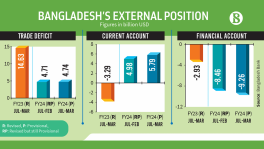A city unfit for working women
94 percent women faces harassment on public transport

Sraboni Alam Biswas, a school teacher, lives in Uttara. She has to leave her home by 7 a.m every day for work as her school is in Baridhara.
Her bus stop is a 10-minute walking distance from her home, but she has to take a rickshaw, which costs her an extra Tk25 to 30 every day.
She had earlier tried to walk the distance but after three incidents of a stranger attempting to grope her, to touch her inappropriately and one person intentionally pushing her off the footpath, she decided to give up walking altogether.
Not that taking a rickshaw has made her immune to harassment.
A few days ago, a man at the bus stop standing behind her began making inappropriate and disparaging remarks. There were many people at the bus stop but no one came forward to stop the man.
She says drawing the attention of policemen would not have helped her either.
Pointing to last year's tragic incident of mob lynching in Dhaka' Badda over a ridiculous rumour surrounding the Padma Bridge, Sraboni said, "Renu was killed in broad day light by a mob. The police could not save her."
"People have advised me to use the police hotline if I am in trouble. I feel unsafe all the time. How many times am I going to call 999 or go to a police station to file a general diary?"

Fault lines in the system
Women have made tremendous strides over the last five decades in Bangladesh. Female participation in the labour force reached nearly 36 percent in 2016, from a paltry 4 percent in 1974. Our largest export industry – readymade garments – employs around a million and a half women.
But as more and more women join the workforce, incidents of harassment and violence against women, especially in public places, are also on the rise. Besides, women have to regularly tackle everyday issues such as finding appropriate public transport, a public toilet etc – all of which make city commute unbearable.
In 2018, Brac University ran a survey titled "Roads free from sexual harassment and crash for women," which revealed that about 26 percent of the women get abused on the streets.
The report found out that 81 percent of harassed women remain silent and 79 percent of them avoid the troublesome places, the way Sraboni did.
However, being groped on the footpaths for some women can mean they 'got off easy'.
The death of Zakia Sultana Rupa who was gang raped and killed on her way to tangail on a bus, in 2017 is a reminder of how unsafe public transportations and travelling at night can be for women.
Another research by Brac in 2019 revealed that 94 percent women faces harassment on public transport. According to report by Jatri Kalyan Samiti last year, 59 women were raped on public transport.
The farce of reserved seats
According to the Road Transport Act 2018, there should be six seats reserved for women, children and disabled on minibuses and nine seats in bigger buses that ply the streets of Dhaka.
Mozammel Haque Chaowdhury, general secretary of Jatri Kalyan Samity said the number is inadequate considering the number of women who work and the recent incidents of harassment faced by women.
Mithila, a commuter who uses public buses in Dhaka, said, "In many cases, most of these seats remain occupied by men."
According to law, one will have to pay Tk5,000 fine for occupying the seats reserved for women, children and disabled in public buses.
However, no one is aware if the law has ever been implemented or who the responsibility authority to implement it is.
According to female commuters, most of the reserved seats are illegally placed on top of the bus's engine and therefore uncomfortable and unhealthy.
Ride–sharing – a failed saviour
For those who can afford it, ride-sharing services like Uber, Pathao and Sohoz or OBHAI has initially become a saviour. Things have however changed a lot since their introduction.
One of the common problems female commuters face while using those platforms are that the drivers get access to their phone numbers and sometimes their addresses, and start harassing them.
One of the commuters said she was bullied for her weight by a bike-sharing driver and was forced to end the trip before reaching her destination.
Several women tried complaining to the authorities of these ride-sharing services, but most of these cases were unattended or unresolved.
Some of these cases were taken to nearby police stations, but those have not been resolved either.
Avoiding water altogether
For many women, the lack of public amenities such as toilets is a major drawback.
A social service start-up Bhumijo recently ran a survey, cited by the World Bank, that revealed 79 percent women in Dhaka suffer from urinary tract infection as they do not drink adequate.
In an informal survey, this correspondent asked around 20 working women how much water they drank in a day. All of them replied "hardly one litre". (The standard is at least 2 litres a day)
All of those women said they avoid drinking water before going out as there is no hygienic toilet to use out there.
A book published by the World Bank showed that there are only 57 public toilets in a city of 20 million people – Dhaka. Only five of them are in good shape.
Bhumijo took up a project recently and cleaned up the public toilets in the city.
There is a long way to go as Dhaka needs at least 3,000 bathrooms to cope up with the population.
Hostility increases after sunset
Around 70 women interviewed by this correspondent living in Dhaka agreed in general that the risk of getting harassed after sunset is higher.
They said, after sunset, the buses refuse to take them aboard, harassment increases at an alarming rate, and rickshaw or CNG autorickshaw fares go up very high. A serious problem for women is that most streets do not have streetlights.
"In election campaigns, leaders promise a woman-friendly city but no one has ever explained the process of how it is going to be friendly for women," said
She said, "We need infrastructural changes to make a city women-friendly. Although the gender budget constituted 30.8 percent of (last year's) the total budget it is not clear where and why the money was allocated."
Turning to the law
Like Sraboni many women are reluctant to take their complaints to the police.
"As there is no accountability in our system, we need to restructure our entire law enforcement agency," says activist and researcher Maha Mirza.
She pointed to the hostile environment in the police stations where first, there is a lack of female police officials and the fact that cops are often misogynistic in nature. Only training is not enough for them, she said.
"There has to be a real political will to make positive changes, which is completely missing," said Maha.
When this correspondent made a call to the Dhaka Metropolitan Police (DMP) Victim Support Centre, it became quickly clear why women are reluctant to use such services.
Preferring to be anonymous, the DMP official told this correspondent, "Most of our laws are in favour of women, while we do not have any law for men. In most cases in the court, women are at fault and men are deprived of justice."
When asked to cite a few discriminatory laws and examples of such events, the police official said, "There are women who do not listen to their husbands and lead an irresponsible life. If the husband then gets mad, whose fault is it?"


 Keep updated, follow The Business Standard's Google news channel
Keep updated, follow The Business Standard's Google news channel
















